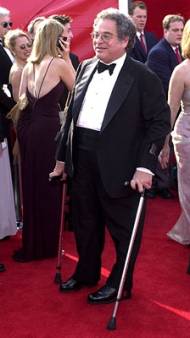Integrity Matters Broadcasts
July 1, 2005
Hit the ground running
Dear Friends:
Learn how to "hit the ground running" from
someone for whom walking is a challenge. Violinist Itzhak
Perlman personifies courage, conviction and creativity.
 |
 |
Perlman at the
2001 Academy Awards: greeted by fans and in concert.
Photos by John McCoy.
|
by Jack Riemer, Houston Chronicle -- "On
November 18, 1995, Itzhak Perlman, the violinist, came
on stage to give a concert at Avery Fisher Hall at Lincoln
Center in New York City. If you have ever been to a Perlman
concert, you know that getting on stage is no small achievement
for him. He was stricken with polio as a child, and so
he has braces on both legs and walks with the aid of two
crutches.
To see him walk across the stage one step at a time, painfully and slowly,
is an unforgettable sight. He walks painfully, yet majestically, until he
reaches his chair. Then he sits down, slowly, puts his crutches on the floor,
undoes the clasps on his legs, tucks one foot back and extends the other
foot forward. Then he bends down and picks up the violin, puts it under his
chin, nods to the conductor and proceeds to play.
By now, the audience is used to this ritual. They sit quietly while he makes
his way across the stage to his chair. They remain reverently silent while
he undoes the clasps on his legs. They wait until he is ready to play.
But this time, something went wrong. Just as he finished the first few bars,
one of the strings on his violin broke. You could hear it snap -it went off
like gunfire across the room.
To learn what Itzhak Perlman did next, reflecting
his courage, conviction and creativity: http://www.brachercenter.com/article_perlman.html
Making "music" with what we have
and what we have left:
Observations have been made by the Los Angeles Times about
the responsibilities thrust upon Los Angeles Mayor-Elect,
Antonio Villaraigosa. Los Angeles voters want a mayor who
will do things about the failing public schools, deliver
more qualified police officers, invest in housing and commercial
development and not say, "I can't." So,
how does this new mayor intend to "hit the ground
running" and meet the needs of his constituents?
In order to hit the ground running, the Los Angeles
Times recommends Mr. Villaraigosa do the following:
- Build coalitions by bringing people
with a wide variety of positions, including critics,
onto problem-solving teams, borrowing ideas and then
behaving boldly. As a mentor taught me, a stranger is
simply a friend with whom one is not yet acquainted.
If variety is the spice of life, then civil discussions
between and among those with differences of opinion are
the crucibles in which constructive creativity and intelligent
solutions are found. Listen. Listen. Listen.
- Lead and manage the city like a treasured
family business with an open and honest city hall. The Los
Angeles Times suggested that Mayor-Elect, Antonio
Villaraigosa reward the voters and not the campaign contributors.
In business terms this means to make sure that all stakeholders
are appreciated and served. Respect. Respect.
Respect.
- Operate with humility and graciousness.
Again, from the Los Angeles Times, "Do
not use this as a stepping-stone unless and until you
have done a spectacular job for Los Angeles for the next
four years." Business operates similarly. A fast
and effective start means doing the job, allowing any
future promotion to come from colleagues who will support
a strong leader. Colleagues, new or old, resent opportunists
who simply use people as pawns in their personal power
game for self-aggrandizement and position. Incorporate
behaviors reflecting the Eight Attributes© of Integrity-Centered
Leadership - all the time.
Making similar efforts to those of violinist Itzhak Perlman,
the new Mayor of Los Angeles will need to work with what
he has. He too must leverage his creativity to rally resources
and bring harmony and vitality to a giant city in need
of reassurance and leadership. Are the efforts of these
well-known people very different from what each person
is challenged to do, every day? No.
Positive impact requires planning, perseverance
and people-skills.
Famous entrepreneur, J.C. Penney, offered wisdom about
leadership. He gave a great deal of credit to getting ready
for whatever it was he intended to accomplish. Practice
was not simply a concept; it was, for him and his team
members, a rigorous set of disciplines. His seven "P's" are
as profound today as they were a century ago: proper
prior planning prevents pathetically poor performance.
Starting a new job, finishing an old one, building new
relationships or sustaining old ones - the tasks
are the same. A case in point emerges from my February
2, 2005, Integrity Matters column responding to
an inquiry about how best to get started in a new position.
Here is the question and the response:
Dear Jim: I have recently
accepted a significant business promotion, in another
state, with a new company. What is the most effective
way for me to get started, with my new team, quickly
and effectively?
Response: You wouldn't
have gotten the job unless you'd developed a strong and
successful track record and were effective in selling
yourself. Organizations do not move people across the
country unless they possess credentials, capacity, motivation
and communications skills.
You can manage your successful assimilation into
this new company around seven purposeful and constructive
actions: http://www.brachercenter.com/columns/2005/2005-2-2.html
Individuals do not get a second chance to make
a first impression. It is important, therefore, to sustain
efforts to hit the ground running. To maintain your momentum,
reflect on these 20 ways that create negative impressions
and minimize positive impact:
- Think about yourself.
- Talk about yourself.
- Use "I" as often as possible.
- Mirror yourself continually in the opinion of others.
- Listen greedily to what people say about you.
- Expect to be appreciated.
- Be suspicious.
- Be jealous and envious.
- Be sensitive to slights.
- Never forgive a criticism.
- Trust no one but yourself.
- Insist on consideration
and respect.
- Demand agreement with your own views on everything.
- Sulk if people are not grateful to you for favors
shown them.
- Never forget a service you may have rendered.
- Be on the lookout for a good time for yourself.
- Shirk your duties if you can.
- Do as little as possible for others.
- Love yourself supremely.
- Be selfish.
However, if constructive momentum is your goal,
then modify these 20 counter-productive behaviors and
respond appropriately. Think of others
first. Be generous. These actions will enable you to
create a positive impression and hit the ground running.
Exhibiting courage, conviction and creativity
ensures constructive impact. One-third
of the executives who rise to the top of U.S. companies
don't last three years. While much has been written about
what chief executives should do once installed in the
job, little has been said about the period after their
appointment but before they actually take charge. Interviews
with current and former CEOs suggest that this time-frame
(between getting the job and starting the job) can be
used to improve a CEO-elect's chances for success. Newly-designated
CEOs need to carve out time to prepare themselves for
their increased responsibilities. By examining their
strengths and weaknesses, probing the workings of their
new organization and creating a support network, they
can build a stronger foundation to improve their immediate
and longer-term impact. Our Portrait © process
enables leaders to improve operational effectiveness
by enhancing self-awareness. http://www.brachercenter.com/PortraitProcess.html
Next month, the August Broadcast will
address Success for the Rest
of the Year.
Jim